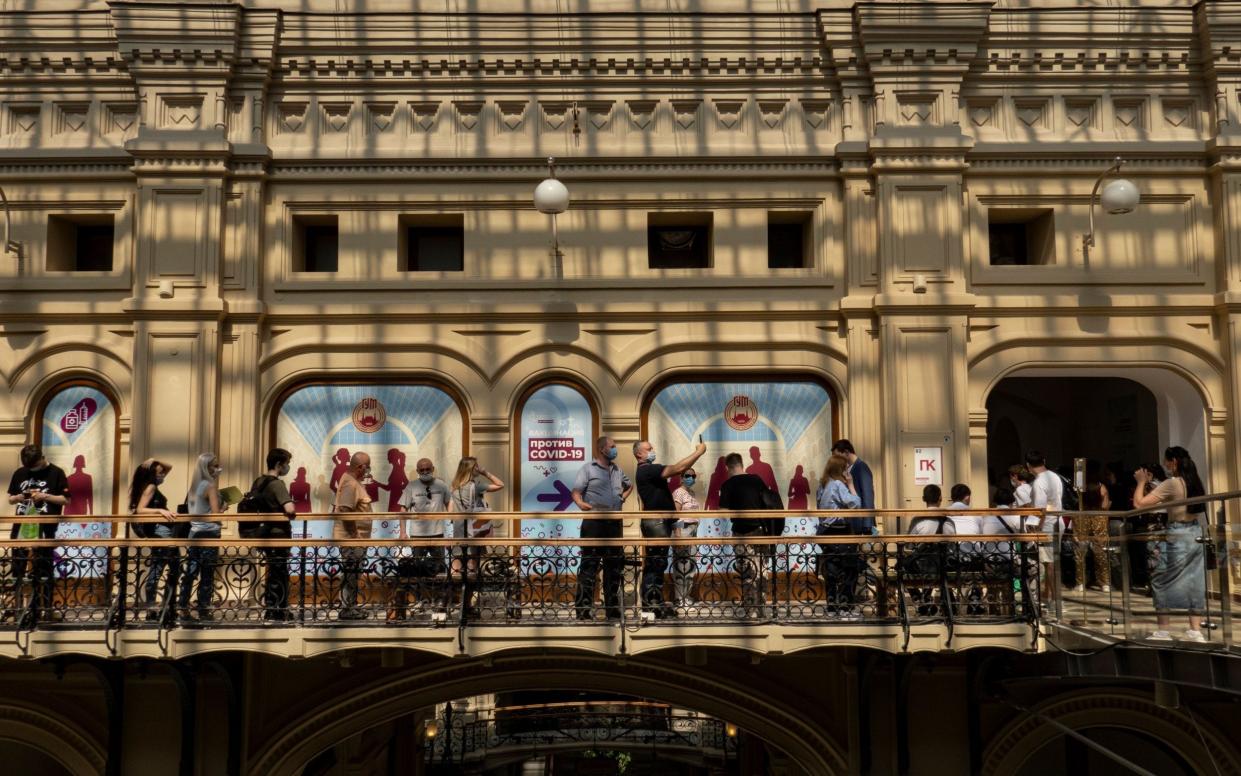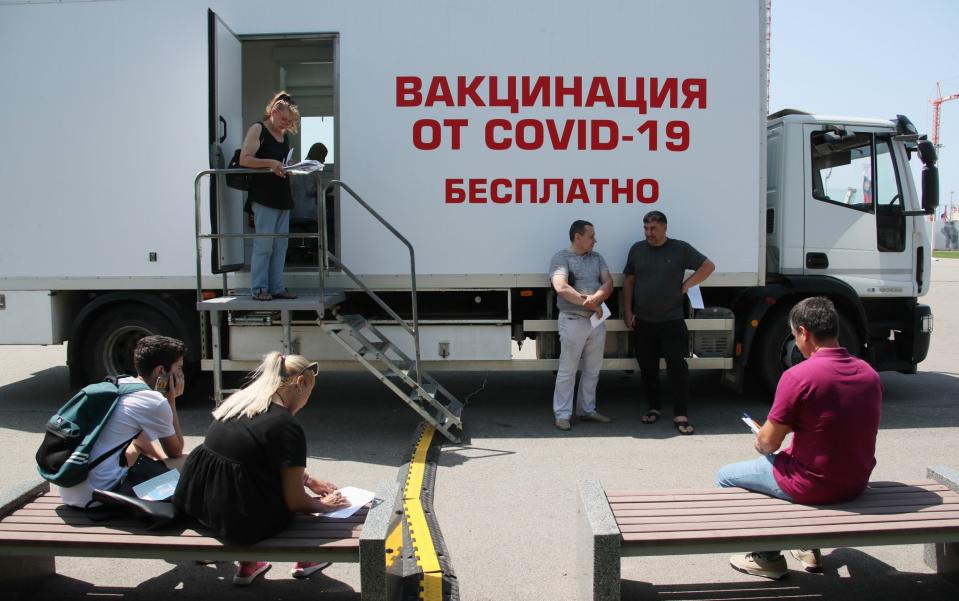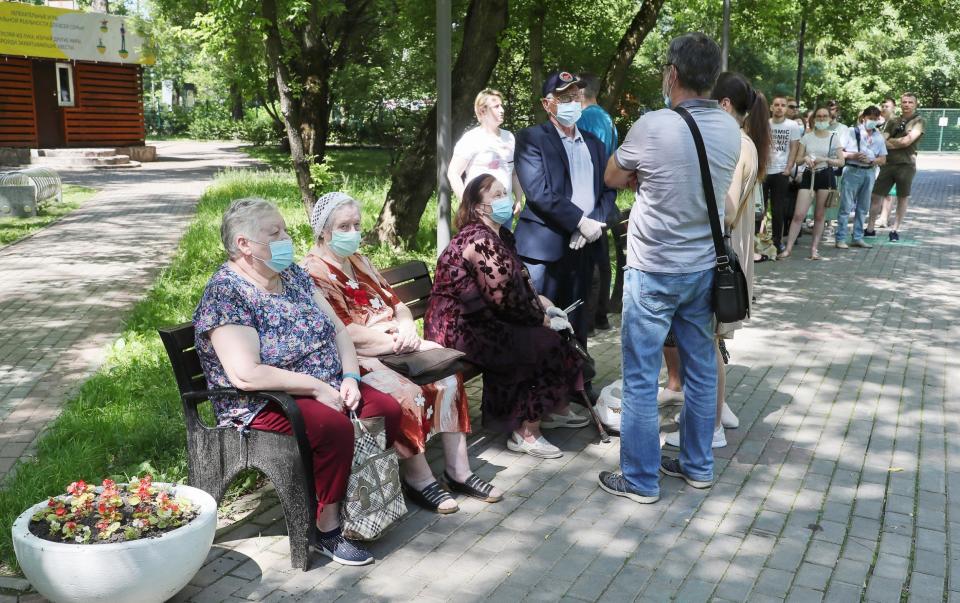Mandatory vaccination drive forces reluctant Russians to get jab

Vaccination centres in Moscow were inundated on Wednesday with people spooked by a tsunami of restrictions that will effectively make Covid vaccinations mandatory in the middle of record-high new infections.
A deep-seated distrust of the government, as well as the Kremlin’s mixed messaging about the pandemic, have made Russians wary of taking the jab, despite Russia being one of the first countries to develop an effective coronavirus vaccine, Sputnik V.
The distrust of the vaccine has also sparked a brisk trade in fake vaccination certificates.
Just 15 per cent of people have received the two-dose jab in Moscow, even though it has been widely available since the end of December.
Sergey Sobyanin, the Moscow mayor who last year ordered a strict lockdown in the city, raised the alarm about a surge in new cases over a week ago, when Moscow started to run out of hospital beds.

Skyrocketing infection rates are blamed on the delta variant, which is now the predominant strain.
Last week, city authorities in Moscow gave employers in public services a month to ensure 60 per cent of their staff had been vaccinated or face a fine.
This week, Mr Sobyanin ordered bars and restaurants in the capital to serve people only if they have been vaccinated or have had an infection indicating immunity. Unvaccinated people are also to be refused non-emergency hospital treatment.
An employee of a vaccination centre in Moscow told The Telegraph that the queues were an hour in duration and that the vaccination centre had stood empty before the decree on mandatory vaccination.
Leonid Guzeev, 41, was one of the many people who were wary of the jab.
“I didn’t want to get one but I realise that soon I won’t be allowed in anywhere: from the metro to the workplace,” he told the Telegraph. “I still have my doubts and I have no faith in the vaccine. The only reason I’m doing it is because I need to provide for my children.”
Sputnik V was shown to be safe and 92 per cent effective against the virus.
People queuing for the jab on Wednesday were mostly working adults who feel they have no choice but to get it.
Viktoria Savchenko who owns a private kindergarten, said the City Hall’s measures had spurred her to get vaccinated even though she had Covid six months ago and assumed she did not need the jab yet.
Ms Savchenko said she wanted to get the jab also to show to her hesitant employees that it was safe.
“Everyone is free to do as they wish but we live in a society, and a person has their obligations. We owe it to the state that we don’t expose others to risk.”
Some of her employees are refusing to get the jab, she added, fearing side-effects. She said they will now have the choice either to prove there is a valid medical reason for them not to take it or quit.
Moscow’s decree on mandatory vaccination covers large swathes of the workforce, from civil servants to those employed in public transport and the service industry.
Several Russian regions have followed Moscow’s suit, making vaccination obligatory for most of the workforce.
Mr Sobyanin on Wednesday lauded the visible surge in new vaccinations, saying that over 60,000 people signed up for the jab on Monday - ten times as much as a few weeks ago.
The mandatory vaccination scheme is seen as the only way to overcome Russia’s strong anti-vax sentiment, which has been bolstered by the Kremlin’s mixed messaging about the pandemic and attempts to co-opt the success of Sputnik V.
The Kremlin approved Sputnik V months before the late-stage trial results were published in the Lancet while President Vladimir Putin did little to underscore the danger of the new disease, refusing to wear a face mask in public and proclaiming a “victory” over coronavirus last year.
He refused to say which vaccine he had been given or to have it on camera.
A survey last month showed that 60 percent of Russians did not want to get vaccinated and almost as many said they were not afraid of the virus.
Russia’s anti-vaxxers count several celebrities in their ranks.
Yegor Beroev, a Russian film star, stunned an audience Tuesday night when he appeared on stage at an awards ceremony in Moscow with a yellow star pinned on his lapel as a sign of protest against mandatory vaccination.

The 43 year old said vaccination should be a personal choice and that “people’s lives and dignity should not be sacrificed for the public good.”
His comments were followed by burst of applause, and his social media accounts were soon flooded with messages of support.
For Lyubov Sobol, the only close ally of opposition leader Alexei Navalny still in Russia, an Instagram picture of herself getting the jab triggered a barrage of hate messages.
Ms Sobol, who lost over 2,000 subscribers after the photo was posted on Monday, stood by her decision to get vaccinated. She said:
“I’m sure that distrust of Sputnik stems from distrust in the government, officials and Putin personally.”
Russian media outlet Baza last week quoted several vaccination card dealers saying that they have a backchannel with doctors who can log a fake vaccination into the nationwide health care database, which makes fake vaccinations almost impossible to trace.
Researchers from the Moscow-based cybersecurity company Group-IB found more than 200 online platforms, offering fake certificates for coronavirus vaccination and tests.
A potential client would have to fork out between 10,000 to 20,000 rubles (£200) for a vaccination entry in their own personal profile on the e-government website to add data about immunisation that never happened.
Authorities are scrambling to crack down on the new business that feeds on the public distrust of the vaccine.
Moscow police earlier this week reported 24 criminal cases for producing and selling fake certificates while Russia’s consumer watchdog said that it has 150 websites blocked and suspended for selling the fake certificates.

